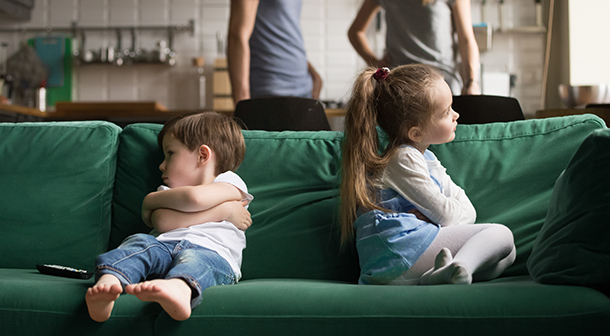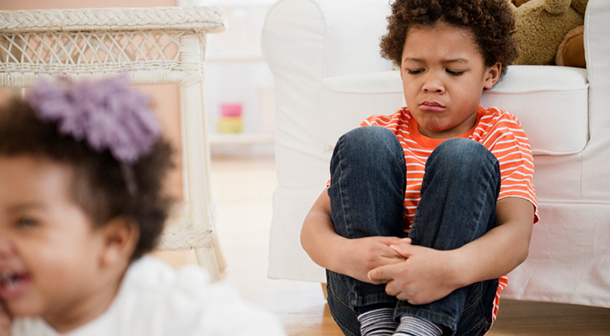Sibling Rivalry in Children and Teens
By Ilyse Kennedy
Read Time: 7 Minutes
The decision to have more than one child comes with many hopes and dreams. You may have visions of your little ones holding hands, being great playmates and becoming best friends for life. You may dream that your children create a secret language that only they know and that one day they'll have kids of their own who also become best friends. Parents want the sibling bond to be strong. But what happens when instead of being best friends, your children engage in sibling rivalries?
First, don't be discouraged if your children start to show sibling rivalry. This is experienced by many families and is more common than you think. Many siblings are competitive with each other, and healthy competition in children is developmentally appropriate. It's our job as parents to notice when healthy competition turns into sibling rivalry and begins to hurt a child's mental health. Being an aware parent will help you realize when this shift is occurring so you can intervene quickly. There are many ways to fix this and repair the relationship so that your children can have the lifelong bond you dreamed of. Sibling rivalry does not have to last forever and often times it doesn't. Understanding why your kids are acting this way can help you problem-solve so they can still grow up to be close friends. Just ask others - many siblings who are close as adults had their fair share of fighting or sibling rivalry!

Sibling rivalry can show up in any sibling relationship. We see it in birth families, adoptive families, and step families. We see it when the first sibling is born, or in the case of step and adopted children, when the new siblings join the family. Sibling rivalry is competition between siblings and it's a natural part of growing up. It happens between little sisters and big sisters, little brothers and big brothers, and brothers and sisters, and often comes from competing for a parent's attention. As kids grow older, it can turn to jealousy of another siblings' accomplishments, causing resentment and creating hurtful sibling relationships.
Parents of little ones may have an easier time dealing with sibling fighting. For parents of older kids and teens, it may be hard to know when to step in. Damaged sibling relationships in the teen years can turn into damaged sibling relationships as adults. If you are facing teen rivalries, is not too late to step in and help mend those sibling relationships. 
The adolescent brain
It's important to understand how the brain works when talking about sibling rivalry among teens. The last part of the brain to develop is the frontal lobe. The frontal lobe is the impulse control center for the brain and typically doesn't finish developing until age 26. This means children and teens have far less impulse control than adults.
Studies have also shown that the reward center of the brain is more sensitive in teens and so it is easily triggered. With little impulse control and a heightened rewards center, the teen brain is primed to make impulsive decisions to get quick satisfaction. Understanding how the teen brain works can help parents better understand why sibling conflict occurs.
Why all the sibling fighting?
Children, especially teens, often seek rewards and validation in several forms and from multiple people, including peers and parents. Although they may not say so, most teens want to be rewarded and validated by their parents. Watching their parents praise another sibling can be disappointing and painful for the child who is not getting the attention, and that can lead to jealousy and fighting. In addition to wanting recognition from Mom and Dad, they also want to be accepted by their peers.

Sibling rivalry is competitive in nature. Not only do children fight for attention but often they are seeking independence or empowerment. A typical conflict might include wanting space from each other; a power struggle over who gets to control the TV; or competing over grades, popularity, talent, and other things. Siblings may envy certain traits or things that their sister or brother are good at and feel they are not good at those same things.
Many factors determine how sibling rivalry plays out and who is affected most. These include birth order, family composition, mental health issues, or physical health or disabilities within the family. Same-sex siblings tend to fight more often and younger children want the same privileges as older brothers and sisters. Some kids fight to make their sibling look bad so they can try to be the favorite child. Firstborns may have the most challenges with a baby sister or brother as they are forced to share the attention they once had to themselves. Parents need to understand that this is normal. This is a great time to give the oldest sibling lots of extra hugs and "I love you's" when a new child joins the family.
Need parenting help now?
The Texas Parent Helpline is available 24/7.
- Call 833-680-0611
- Chat with us
- Text 833-680-0611
When and how should parents step in?
Knowing when to break up an argument can be tough for a parent. When children are younger, parents may need to step in more often to help resolve conflicts. But, If possible, it's best to let siblings resolve things on their own. Encourage them to find solutions so they learn how to problem-solve.

If a situation gets too out of hand, help your kids calm down by allowing them to explain what happened. Be sure not to take sides and always listen to both children and their points of view. If hitting is involved, make sure they know hitting is not allowed and is not the way to fix a problem.
When children do resolve conflicts on their own, be sure to recognize their efforts and praise them for finding a solution. It's important for children to understand that apologizing is a good thing, and that everyone needs to learn to apologize. This includes parents saying, "I'm sorry" to children and each other. Your openness to repairing relationships teaches your kids to do the same. If children learn that it's okay to fight without apologizing or finding a resolution, they will learn this behavior is okay. Being a good role model can help you cope with sibling fighting and finding resolutions.

Building a relationship with each child
Spending quality time with each of your children can be important in minimizing sibling rivalry. If you have a large family, it may be difficult to plan alone time with each of them. Try creating rituals that include one-on-one time with each child. These can be short and sweet- as simple as getting ice cream from a special place one night a week, taking a walk together, or reading a favorite book. The ritual should highlight something specific and special to that child.
As children grow up, they don't lose their need for their parents, they just need them in a different way. Developmentally, teens may be pushing away from parents as they find their independence, and you may have more family arguing. During this stage, find ways to be involved with things you both can enjoy. It could be shooting hoops, running together, cooking, or watching their favorite television show.
Planning for alone time with each child allows him (or her) to feel connected and valued. When each child feels valued, he doesn't need to fight for attention or feel overshadowed by a sibling. Of course, one-on-one time is not the only step in resolving sibling rivalry. Creating family time is also critical in creating strong family connections.
It is easy to forget the importance of play as children and teens grow older. Don't forget to play as a family, but also consider the competitive aspect between siblings as you make your plans. A family game night may not be the best option. Instead, think about walks together or volunteering for a local charity.
When to seek help with sibling rivalry
Not all sibling rivalry can be solved simply. Sometimes the issues are too deep for parents to be able to handle alone. Sometimes sibling rivalry can lead to violence, or one child may begin to develop low self-esteem, depression, or anxiety. In extreme cases, parents may see signs of suicidal ideation or threats, where a child loses interest in activities he enjoyed, distancing himself from siblings or other family members.
Family therapy or parent coaching can be helpful in these situations. Asking for outside help doesn't mean you're doing anything wrong or that you've failed as a parent. When resolving conflicts in the family, outside help is often necessary - especially if sibling rivalry becomes violent, doesn't stop in response to establishing boundaries or enforcing consequences, or if a child's mental health is affected, such as developing depression or anxiety.

Encourage healthy sibling relationships
All relationships take time, commitment, and lots of work. Parents can help their children build stronger relationships by following these reminders:
- Treat your children as unique individuals and avoid showing favoritism.
- Stay calm and open-minded when kids argue.
- Make sure they know the family rules, including no hitting.
- Allow children the opportunity to resolve their conflicts as much as possible.
- Encourage problem-solving and being respectful of each other's feelings.
The good news is that siblings do love each other, even if they squabble, and they often do get past it and become friends. But for some siblings it can take some time. As much as parents want their children to be friends, don't try to force it. They will get there in their own time. As a parent, you can help lay the groundwork by ensuring your children are respectful to each other and by establishing positive family connections. This will promote greater self-esteem in each child, which should lead to less sibling fighting as each child feels loved, valued, and respected.




